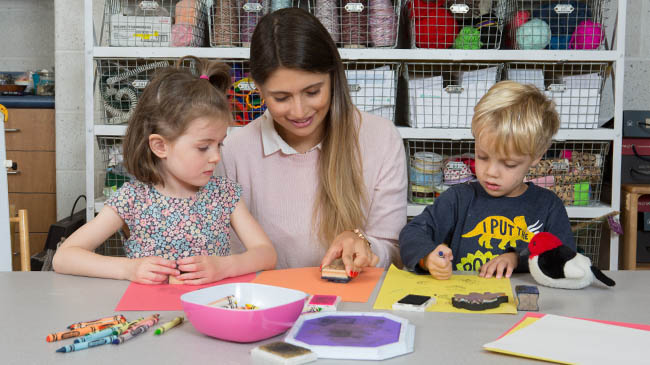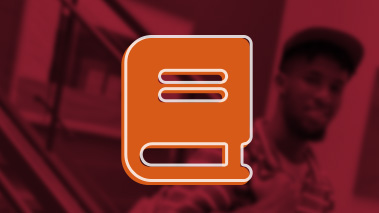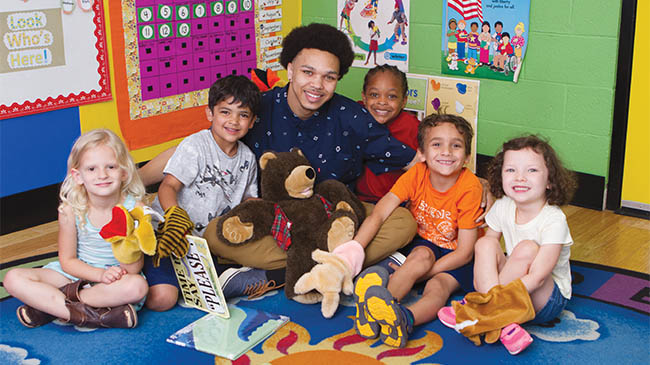Early Childhood Development
- Certificate (C)
Program Snapshot
Your Learning Options
In-person, Hybrid, Online
34 Credit Hours
Estimated Time to Complete
1 year (3 full-time semesters)
In-State Tuition Per Credit Hour
$176.00 | Calculate your costs
Why Early Childhood Development?
Prepare for a rewarding career nurturing young minds and become a vital contributor to the growth and development of future generations.
- Study in our one-year certificate program that offers an accelerated pathway to acquiring vital skills in early childhood development.
- Engage in hands-on, applied learning experiences where you directly apply skills, theories, and models in real-world settings.
- Gain practical experience that prepares you to excel in various roles within the early childhood education sector.

Program Roadmap
Get all the details on our Early Childhood Development - Certificate program, including class sequences, admission requirements, financial considerations, and more.
Paying for College
We are committed to using all of the available funds to help you gain access to a college education. In fact, more than 91% of our students graduate without any educational debt. In 2023, Reynolds Community College students received over $21 million dollars in grants, loans, work-study and scholarships with the average aid awarded totaling over $4,000 per student.
Payment plans are offered to break down tuition payments. Textbook Assistance and Laptop Lending Programs are also available. Be sure to explore all the types of financial aid available as well!


Get a Skill. Get a Job. Get Ahead.
G3 financial assistance at Reynolds can help cover tuition for select programs like this one! Starting something new or changing a career path can be scary, but if you want to earn workplace certifications or an academic degree that leads to a career, G3 tuition assistance can help remove the financial barrier of going to college.
Why Reynolds?
We are more than a community college.
Reynolds is the key that unlocks the door to your academic and professional success. Here you will find a safe place to start. We will help you explore, dream, succeed, try, and try again. Our amazing faculty and highly personalized advisors, your Reynolds Navigators, are well known for guiding you to discover that "aha moment.” That means an outstanding college experience, less debt, more freedom, and a solid start on your future.

Earn stackable credentials that pave the way for further education and career advancement, including the opportunity to pursue an Associate of Applied Science (AAS) degree. Our program sets you on a trajectory towards higher qualifications and expanded job opportunities in the field.
Capitalize on the national shortage of early childhood education teachers and caregivers. Your expertise will be in high demand, opening up diverse employment opportunities.


Take advantage of scholarship opportunities such as the Virginia Department of Education Child Care Provider Scholarship and Virginia Early Childhood Foundation's Project Pathfinders Scholarship. These scholarships help alleviate financial barriers by covering course fees and books, allowing you to focus on your education and career goals.
The only secret is to keep going… If you fall 100 times then you get up 101 times.
Keya Wingfield

Class Highlights
CHD 120 - Introduction to Early Childhood Education
Introduces early childhood development through activities and experiences in early childhood, pre-kindergarten, kindergarten, and primary programs.
CHD 145 - Teaching Art, Music, and Movement to Children
Focuses on children’s exploration, play, and creative expression in the areas of art, music, and movement.
CHD 165 - Observation and Participation in Early Childhood/Primary Settings
Focuses on observation as the primary method for gathering information about children in early childhood settings.
Additional Program Information
PURPOSE: The one-year certificate in Early Childhood Development is designed to prepare students with skills related to the care, supervision, education, and development of young children from birth to age eight. There is also the ability to become qualified to work with children up to the age of twelve in programs that serve before- and after-school and recreational programs.
OCCUPATIONAL OBJECTIVES: Employment opportunities include preparation or upgrading skills for positions as child care center directors, assistant directors, before- and after-school teachers or assistant teachers, aides, playroom attendants, home-based providers or day care workers, camp directors, and before- and after-school teachers in the following types of facilities: child day care centers, nursery schools, family day care homes, Head Start programs, recreational before- and after-school programs, hospital-based child care programs, pre-school at-risk programs, and pre-kindergarten church-sponsored programs.
STUDENT LEARNING OUTCOMES:
- Demonstrate the use of appropriate positive guidance strategies with children in care.
- Design and deliver age-appropriate learning activities and environments that align with established developmental milestones for children.
- Demonstrate effective communication and interpersonal skills in interacting with children and families from diverse backgrounds, building respectful and reciprocal relationships.
- Evaluate and adapt learning activities to accommodate specific developmental, physical, and learning needs of children with identified disabilities or exceptionalities.
- Develop a comprehensive program operations plan that specifies required staffing, facility needs, budget projections, and educational materials for a children’s program.
ADMISSION REQUIREMENTS: General college curricular admission.
PROGRAM NOTES: General college curricular admission, including direct enrollment English and Math placement. Students who do not meet required placement levels must enroll in developmental studies courses. It is recommended that students arrange for a personal interview and advising appointment with the Department Chair.
PRACTICUM REQUIREMENTS: An observation and participation in an approved early childhood/primary setting are required in the second semester of the Early Childhood curriculum. This is a practicum experience internship in a licensed or approved childcare setting. It is a planned learning experience for the purpose of pulling together the theories and practices learned in the classroom. A Criminal Record Clearance/Sex Offender Registry Check is required for placement and volunteering. Students should see the Department Chair for a list of convictions that will prevent employment. Students will be expected to complete a tuberculosis test before practicum placement.
Students must attain a grade of “C” or higher in all courses with CHD, PSY, and EDU course prefixes.
COMPUTER COMPETENCY REQUIREMENT: Students in this program will meet the college’s computer competency requirement by successfully completing ITE 152 or EDU 280 (Introduction to Instructional Technologies). Students can also meet this requirement by passing the college’s computer competency exam, administered in the testing centers on each campus, in which case they will receive college credit for ITE 152. Students not passing the computer competency exam may retake the exam only once.



